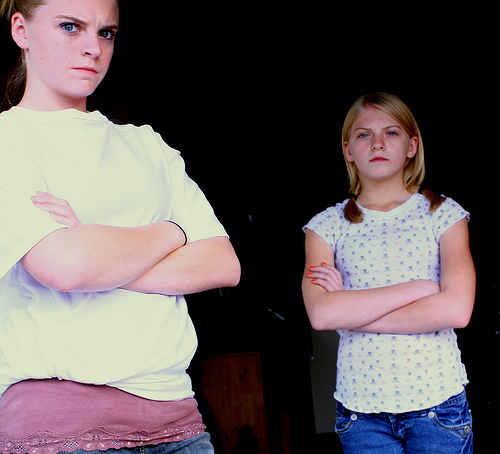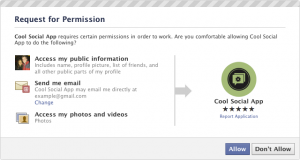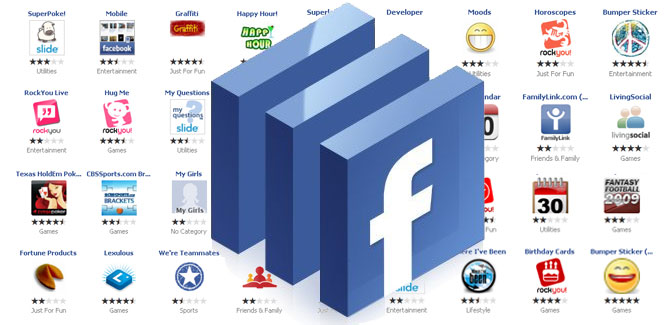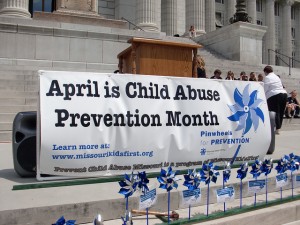It's really hard to be a parent and try to relate to what childhood is like for my kids. I know what it was like to be a tween and teen back in the 20th century, not what it's like today.
Steven Woda

Recent Posts
What to Do When Your Child Is Cyberbullying Victim
If your child has being harassed by a cyberbully, would you know what to do? Responding to cyberbullying can be more complicated than you think, and the right way to react depends on exactly what's going on.
Finding that someone is bullying your child makes you want to act immediately, but keep your cool and ask questions first. Most victims of cyberbullying don't tell their parents because they think doing so will only make it worse. So before you start making phone calls to the bully's parents, the principal, or the police, find out:
Kids Safety: How Depressives Surf the Web
 An interesting article reported by the New York Times: Kids Safety, Facebook Depression and How Depressives Surf the Web. By SRIRAM CHELLAPPAN and RAGHAVENDRA KOTIKALAPUDI
An interesting article reported by the New York Times: Kids Safety, Facebook Depression and How Depressives Surf the Web. By SRIRAM CHELLAPPAN and RAGHAVENDRA KOTIKALAPUDI
IN what way do you spend your time online? Do you check your e-mail compulsively? Watch lots of videos? Switch frequently among multiple Internet applications — from games to file downloads to chat rooms?
We believe that your pattern of Internet use says something about you. Specifically, our research suggests it can offer clues to your mental well-being.
In a study to be published in a forthcoming issue of IEEE Technology and Society Magazine, we and our colleagues found that students who showed signs of depression tended to use the Internet differently from those who showed no symptoms of depression.
Facebook Targets Kids Under the Age of 13: Facebook For Kids?
 Is Facebook creating a melting pot for online predators and cyberbullying by allowing kids under the age of 13 to join? Or can parents use the opportunity to educate, engage and protect their kids through monitored use?
Is Facebook creating a melting pot for online predators and cyberbullying by allowing kids under the age of 13 to join? Or can parents use the opportunity to educate, engage and protect their kids through monitored use?
You may have noticed that Facebook has been in the news quite a bit recently. There was the largest IPO in US history, there was a Mark Zuckerberg wedding, a lot of noise surrounding the IPO and insider information, falling stock prices, a new Facebook Photo app, and now most recently: leaked speculation that Facebook is exploring the possibility of opening its doors to children under the age of 13... with parental supervision that is. So what exactly does that mean for parents?
Arlington Schools Consider Social Media Policy in Lieu of Sexting
 With the sprawling number of cyberbullying, sexting, and faculty/predator scandals of late the Arlington County School Board is Considering a Social Media Policy applying to teachers and staff. As reported by Whitney Wild of WJLA below:
With the sprawling number of cyberbullying, sexting, and faculty/predator scandals of late the Arlington County School Board is Considering a Social Media Policy applying to teachers and staff. As reported by Whitney Wild of WJLA below:
"In the wake of scandals involving inappropriate student-teacher conduct, Arlington public schools are re-evaluating how teachers can use social media to interact with students.
Sexting and Porn? Is Your Child Accessing Internet on Their Phone?
It's easy to focus on the desktop or laptop computer in our child's life and forget that the Internet is just as accessible from the cell phone hidden in their pocket. Previously we mentioned 4 reasons to monitor your child´s cell phone. Internet dangers don't become less prevalent or less serious because our kids are on a phone instead of a computer.
This week, take some time to evaluate whether you're allowing things on the smartphone that you wouldn't on the Internet, or vice versa. It's the same Internet, and the same rules should apply no matter how your child is accessing it.
If you've got a teenager with a phone, do you talk about how they're using it to go online? If you are guilty of monitoring computer usage more than phone usage, you're not alone.
Every Parent Uses One: Types of Parental Controls
Knowing what parental control options are out there is essential to any parent whose children have reached the age where they can go online by themselves.
Kids can easily stumble across inappropriate content, or they might go looking for trouble online. In either case, some of the following options might be useful components of the parental controls you use to keep your kids safe every day.
-
Site blocking and Content Filtering – blocks inappropriate sites based on algorithms that determine content, can be purchased software or a built-in component of your PC or the search engine you use
-
Keystroke Logging – keeps track of user names and passwords entered online
-
Time Allowance – controls duration and times of day when Internet use is allowed
-
IM,Chat, and Email Logging – keeps records of both sides of virtual conversations your child has
-
Built-in Controls – almost every computer, phone, and gaming console has options for parents to filter, limit, or block certain features of online use
-
Web-based services – monitors your child's online activity, delivers regular reports to you, and usually alerts you immediately if dangerous activity is detected
-
Parental Involvement – knowing where and when your child is online and actively enforcing household rules about Internet use.
Today's Teens Aren't the Only Ones Sexting and Cyberbullying (Part 2)
“Is it spying or is it good parenting when parents closely monitor teens’ online activity?” asks Tony Anscombe. “Parenting teens that have grown up alongside the Internet and with mobile phones in hand requires an entirely new set of rules and tactics. Our research reveals that while parents trust their teens to do the right thing, such as avoiding pornography on the Internet and 'sexting,' they are still concerned about their children’s safety and how teens’ online behavior may affect their future careers."
Forty percent of American parents worry the content their children post to Facebook and other social networks will affect their children’s job prospects down the road. Adding to this stress, less than 50 percent of American parents feel their child’s school is doing a good job preparing their students for the online world. They aren’t alone in their concerns. Digital Coming of Age found that nearly half of all parents around the globe felt that schools were not effective in teaching their teens to responsibly use the Internet.
Today's Teens Aren't the Only Ones Sexting and Cyberbullying (Part 1)
For generations, parents have been suspicious of teens’ social activities – and have employed any number of tactics to uncover the truth. Today’s parents are no exception; they simply have more channels to monitor. The fifth Digital Diaries installment conducted by AVG Technologies revealed that 60 percent of American parents surveyed admit to accessing teens’ Facebook accounts without their knowledge, with moms most likely to be the guilty party.
Tuscarawas County, OH- to Offer Cyberbullying Program
 NEW PHILADELPHIA — The Tuscarawas County Public Library-New Philadelphia will offer cyberbullying prevention programs for youth and parents on Friday, May 11 and Saturday, May 12.
NEW PHILADELPHIA — The Tuscarawas County Public Library-New Philadelphia will offer cyberbullying prevention programs for youth and parents on Friday, May 11 and Saturday, May 12.
Facebook for Kids... Not Cool Anymore?
Hey, parents. Just when you were getting used to this whole Facebook thing – you probably set up a profile, friended your kids, and are loving that you can communicate with all your friends near and far – it turns out that Facebook is becoming... uncool.
Facebook started as the underdog, begun by a Harvard sophomore as a way for trendy college students to talk to each other. Facebook was cool, it was a new discovery. People implicitly trusted the fledgling social network. Facebook for kids was the cool new "it" thing.
Kids with Disabilities Especially at Risk for Cyberbullying
Cyberbullying is one of parents' top concerns for their children's health and safety, and it's one of the most common dangers for young people online. And certain kids, namely those with disabilities, are more at risk for cyberbullying than others.
Most kids won't pick on the child with a physical handicap, but children with “invisible” disabilities such as Asperger's, autism spectrum disorder, learning disabilities, ADD and ADHD, and obsessive-compulsive disorder are more likely to be victims of cyberbullying. What's more, these children may not even realize that they are being bullied or taken advantage of.
Understanding ESRB Ratings
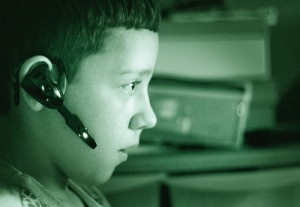 The ESRB (Entertainment Software Rating Board) is a non-profit organization that assigns computer and video game content ratings, enforces industry-adopted advertising guidelines and helps ensure responsible online privacy practices for the interactive entertainment software industry. The ESRB was started so consumers, especially parents, could make informed purchasing decisions.
The ESRB (Entertainment Software Rating Board) is a non-profit organization that assigns computer and video game content ratings, enforces industry-adopted advertising guidelines and helps ensure responsible online privacy practices for the interactive entertainment software industry. The ESRB was started so consumers, especially parents, could make informed purchasing decisions.
The ESRB Rating is made up of two equally important parts: Rating Symbol and Content Descriptors. This two-part approach provides parents with a more granular understanding of the games they might buy and the ones their kids are playing – online and off.
Ratings Symbols
Read More »20 Percent of Third Graders Own Cell Phones: Sexting Issue?
 This article was written by Heather Campobello from WebProNews.
This article was written by Heather Campobello from WebProNews.
A startling new study finds that kids are at risk for sexting, cyberbullying, and more at a much younger age than originally thought. A new study surveyed 20,766 children from grades 3-12 in Massachusetts. The findings are from a self-report so children may not
8 Red Flags for Apps on Facebook for Kids
What Parents Need to Know About Apps on Facebook for Kids
If you have Facebook for kids of your own, you've discovered that it's more than just a social network. It's a platform for thousands of applications that allow you to do pretty much anything.
With apps, you can send a card to a friend, take a quiz to find out which character from The Hunger Games you are, or answer trivia questions that donate proceeds to charity.
But as fun and enriching as they may be, Facebook apps can be a serious security concern – especially where your kids are concerned. Facebook apps can contain malware and many access a ton of your child's personal information – even without his knowledge.
If you are a parent with a child on Facebook, here are some things you need to know about apps:
Read More »Kids Safety: 11 Signs Your Child is Being Targeted by a Predator
Did you know that April is National Child Abuse Prevention Month?
Internet child abuse is disturbingly common and often happens right under a parent's nose. One in five children are sexually solicited online every year, and only one-fourth of them told a parent. When a predator targets a child, they usually spend several weeks or months gaining the child's trust before any real-life abuse occurs.
In honor of National Child Abuse Prevention Month, recommit to protecting your own child, grandchildren, or students by reviewing these 11 signs that your child may be involved with a dangerous person online:
-
Unfamiliar friends on their social networking buddy list
-
Unfamiliar contacts in their cell phone
-
Pornography, especially child pornography, appears for the first time on their phone or computer
Why Are Teens Sexting?
If you have at least one child and haven't been living under a rock since the invention of the smartphone, you know about sexting. Sexting is the sending of nude or suggestive images via technology.
As a parent, this can be a little hard to comprehend. Why would my kids want to do such a thing? I'd like to highlight a few reasons why kids might get caught up in sexting:
Sexting as Flirting
In the bird world, the peacock with the biggest and brightest tail feathers gets noticed – so he fans them up and struts around just as hard as he can in order to attract a mate. Sometimes, teen sexting might be a little like that. In order to be noticed by the object of their affections, kids might feel like they need to send something racy and eye-catching. Or, a boyfriend and girlfriend may trade sexts in a relationship as a sign of their commitment to each other.
Sexting as a Joke
It sounds bizarre, but it's true. Some kids just send sexts to be funny or gross. They may upload a sexy picture to the Internet for the shock value, or just to prove to themselves that they can. (My guess is that this is often done on a dare or as a result of group think.) They obviously aren't thinking about the potential ramifications of their actions, and haven't matured enough to realize that protecting the privacy of their bodies is in their best interest.
Good and Bad News About Cyberbullying and Social Networking
Like everyone else who had a childhood, I endured a bit of teasing growing up. It was about silly things – like my ears, my shoes, my braces – but it hurt nonetheless. At least it was before the dawning of social networks, when I could go home at the end of the day and that was the end of it.
Today's schoolyard bullying is often also accompanied by cyberbullying, which gives bullies an invitation into your home and your life, 24 hours a day. They can bully you anonymously and in a group, on a very public forum where everyone sees it (and can even join in, if they feel so inclined.)
A cyberbullying survey from the Pew Internet and American Life Project says that 80% of teens have a social networking presence on at least one site, Facebook being the most popular. There is good news and bad news about that.
10 Essential Features for Parental Monitoring Software
Looking for an alternative to parental control software? As many of you know, parental control software is an an old fashion lack-luster tool for helping parents trying to keep kids safe online. A more modern approach is the use of parental monitoring software or services. When looking for the right fit, how do you know which products will be worth your time and give you a good return on your money? To get the best protection possible for your kids, look for Parental Intelligence Systems or services with these 10 essential features:
-
Monitors their accounts, not a specific device. Kids access the internet from smartphones, iPads, iPods, gaming consoles. They might use the family computer at home, at a friend's house, or even at the school library.








